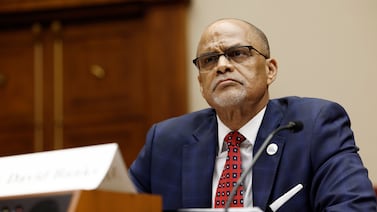Sign up for Chalkbeat Colorado’s free daily newsletter to get the latest reporting from us, plus curated news from other Colorado outlets, delivered to your inbox.
Colorado voters strongly rejected Proposition HH, Democrats’ effort to offer property tax relief while shoring up school funding.
Advocates on both sides seemed to have anticipated the outcome, with the “no” campaign dubbing their watch party a celebration a full day before polls closed and the “yes” campaign not holding a watch party at all.
Proposition HH would have offered home and business owners some relief from rising property taxes while also allowing the state to keep and spend more money from other taxes, such as sales and income taxes. Much of that extra money would have been placed in the state education fund, where it could be used to support K-12 schools. In turn, less money would be available for taxpayer refunds after next year.
“Ultimately, people wanted simple property tax reform, and instead they came up with a 48-page bill that took away TABOR refunds without offering enough property tax relief,” said Michael Fields, president of Advance Colorado Action, a key player in the “no” campaign.
The defeat has renewed calls for a special legislative session, something Gov. Jared Polis has steadfastly refused to commit to. A spokesman said via text message Tuesday evening that Polis is disappointed voters didn’t pass property tax relief, and he is considering next steps.
Lawmakers have until December to provide some sort of property tax relief before the impact of 40% valuation increases hits homeowners and business owners. Any effort to cut property taxes, in turn, will affect funding for schools and many other local districts.
“All these property tax dollars coming in are what allows the governor to balance the budget and pay down the negative factor,” said Bell Policy Center President Scott Wasserman, who supported Proposition HH. “If this money goes away, we have to make up for it.”
The negative factor refers to the more than $10 billion Colorado lawmakers have withheld from K-12 schools to pay for other budget priorities since the start of the Great Recession. This withholding is also known as the budget stabilization factor. Next year’s proposed Colorado budget is the first since 2008 to fully fund schools. Higher local property taxes over the last several years have helped make that possible. More local funding means the state doesn’t need to kick in as much to meet constitutional funding requirements.
Education groups, including the Colorado Association of School Boards, the Colorado Education Association, and Democrats for Education Reform, all backed Proposition HH and provided much of the more than $2 million spent in favor of the measure.
They hoped the extra money Proposition HH would provide for schools would allow funding to increase in the future or help the state avoid cuts in a future recession. They also feared that not providing property tax relief would give fuel to Initiative 50, a measure Fields’ group has placed on the ballot for 2024 that could cap the growth of property taxes at 4% a year.
Wasserman called Initiative 50 a “school district destroyer.”
Yet Polis consistently refused to talk about Proposition HH’s impact on school funding, instead focusing on property tax relief.
Wasserman said the “yes” campaign might have benefited from a more honest conversation.
“Everyone involved should have talked much more holistically than just about property taxes,” he said. “I think the governor could have been more forthcoming with voters about the problem this was trying to solve.”
Wasserman said property taxes pay for so many critical local services, from fire districts to libraries to schools, and voters need to think about how property tax relief affects funding for those services.
Fields said he’ll withdraw Initiative 50 if the legislature provides more significant property tax relief than was offered in Proposition HH and agrees to some sort of cap on future increases. He rejected the idea that school districts would be harmed by a cap on future revenue.
“It’s a matter of prioritization,” Fields said. “I think there should be more money coming from the state. They should be fully funding schools and making sure more of that money gets into the classroom.”
School funding levels in Colorado are set by the state through a formula. The state makes up for whatever local property taxes don’t cover. That means whatever happens with property taxes has major implications for the state budget. Even as the state has struggled to meet its constitutional obligations to fund schools, K-12 education takes up more than a third of the general fund and crowds out other budget priorities, including higher education.
At the same time, Colorado funds its schools below the national average, and rural school districts offer some of the lowest starting salaries in the country.
Colorado voters have repeatedly rejected efforts to raise taxes statewide to increase school funding or to allow the state to keep and spend more money from existing taxes.
Bureau Chief Erica Meltzer covers education policy and politics and oversees Chalkbeat Colorado’s education coverage. Contact Erica at emeltzer@chalkbeat.org.







